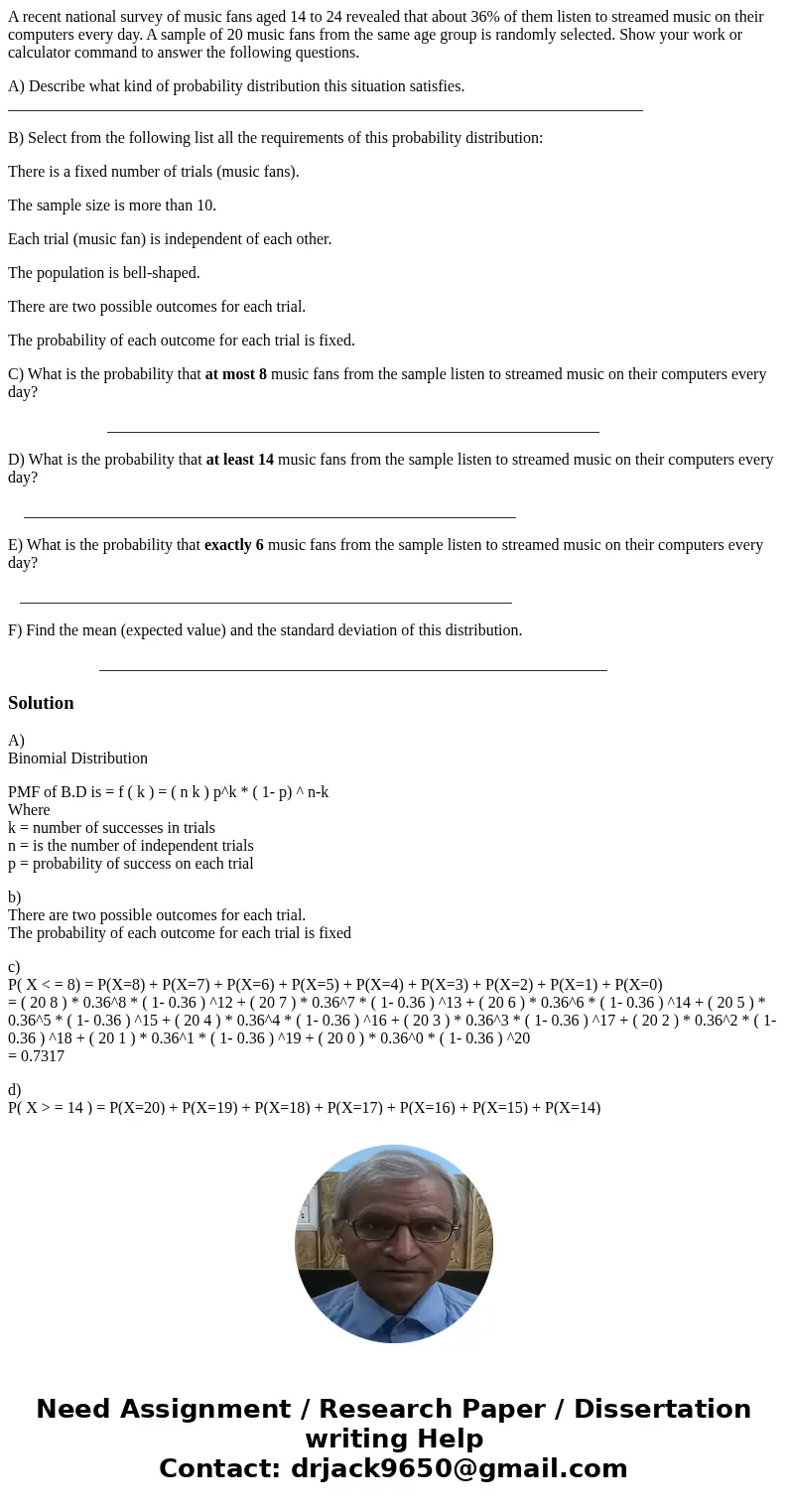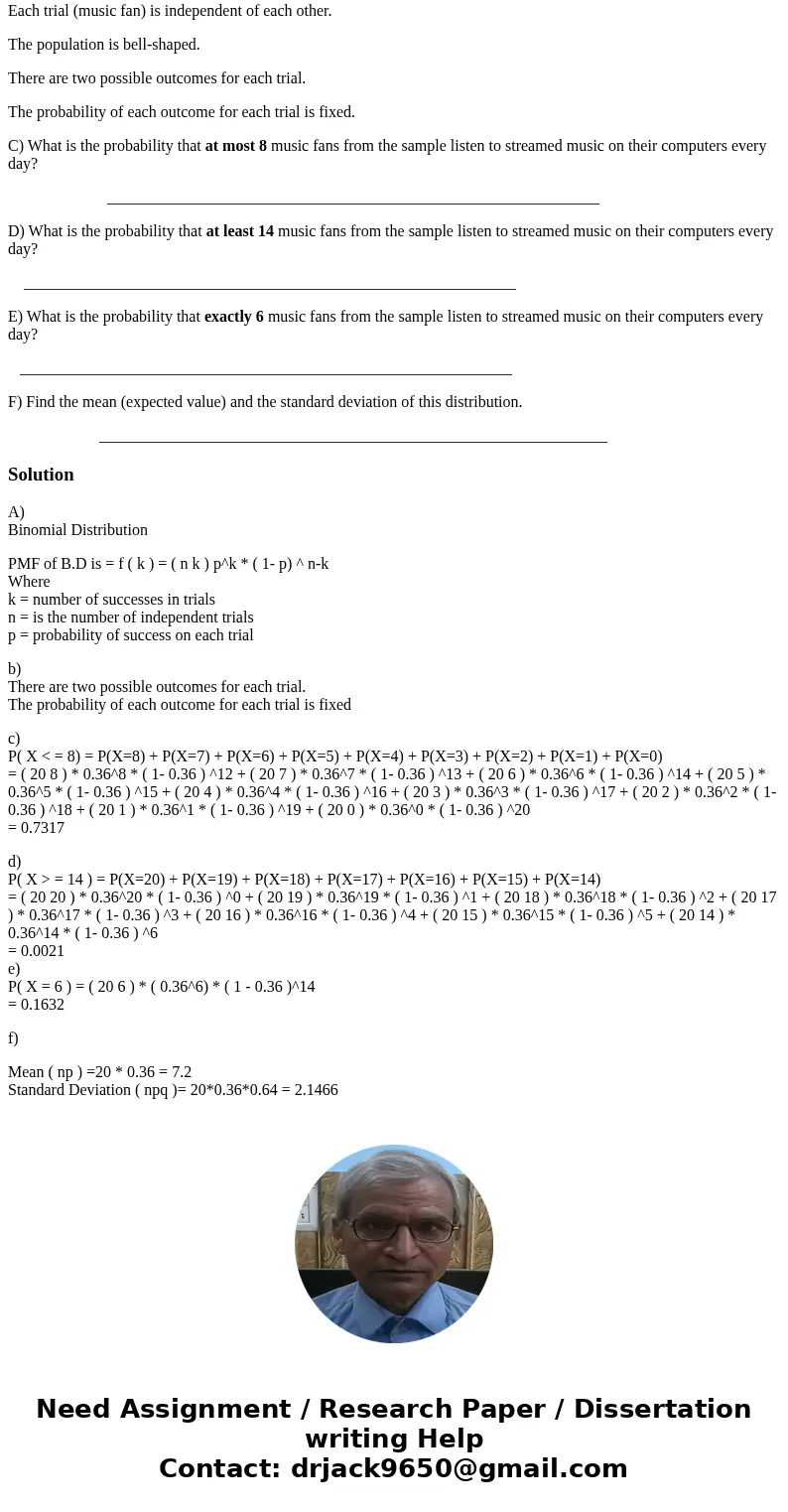A recent national survey of music fans aged 14 to 24 reveale
A recent national survey of music fans aged 14 to 24 revealed that about 36% of them listen to streamed music on their computers every day. A sample of 20 music fans from the same age group is randomly selected. Show your work or calculator command to answer the following questions.
A) Describe what kind of probability distribution this situation satisfies. ________________________________________________________________________________
B) Select from the following list all the requirements of this probability distribution:
There is a fixed number of trials (music fans).
The sample size is more than 10.
Each trial (music fan) is independent of each other.
The population is bell-shaped.
There are two possible outcomes for each trial.
The probability of each outcome for each trial is fixed.
C) What is the probability that at most 8 music fans from the sample listen to streamed music on their computers every day?
______________________________________________________________
D) What is the probability that at least 14 music fans from the sample listen to streamed music on their computers every day?
______________________________________________________________
E) What is the probability that exactly 6 music fans from the sample listen to streamed music on their computers every day?
______________________________________________________________
F) Find the mean (expected value) and the standard deviation of this distribution.
________________________________________________________________
Solution
A)
Binomial Distribution
PMF of B.D is = f ( k ) = ( n k ) p^k * ( 1- p) ^ n-k
Where
k = number of successes in trials
n = is the number of independent trials
p = probability of success on each trial
b)
There are two possible outcomes for each trial.
The probability of each outcome for each trial is fixed
c)
P( X < = 8) = P(X=8) + P(X=7) + P(X=6) + P(X=5) + P(X=4) + P(X=3) + P(X=2) + P(X=1) + P(X=0)
= ( 20 8 ) * 0.36^8 * ( 1- 0.36 ) ^12 + ( 20 7 ) * 0.36^7 * ( 1- 0.36 ) ^13 + ( 20 6 ) * 0.36^6 * ( 1- 0.36 ) ^14 + ( 20 5 ) * 0.36^5 * ( 1- 0.36 ) ^15 + ( 20 4 ) * 0.36^4 * ( 1- 0.36 ) ^16 + ( 20 3 ) * 0.36^3 * ( 1- 0.36 ) ^17 + ( 20 2 ) * 0.36^2 * ( 1- 0.36 ) ^18 + ( 20 1 ) * 0.36^1 * ( 1- 0.36 ) ^19 + ( 20 0 ) * 0.36^0 * ( 1- 0.36 ) ^20
= 0.7317
d)
P( X > = 14 ) = P(X=20) + P(X=19) + P(X=18) + P(X=17) + P(X=16) + P(X=15) + P(X=14)
= ( 20 20 ) * 0.36^20 * ( 1- 0.36 ) ^0 + ( 20 19 ) * 0.36^19 * ( 1- 0.36 ) ^1 + ( 20 18 ) * 0.36^18 * ( 1- 0.36 ) ^2 + ( 20 17 ) * 0.36^17 * ( 1- 0.36 ) ^3 + ( 20 16 ) * 0.36^16 * ( 1- 0.36 ) ^4 + ( 20 15 ) * 0.36^15 * ( 1- 0.36 ) ^5 + ( 20 14 ) * 0.36^14 * ( 1- 0.36 ) ^6
= 0.0021
e)
P( X = 6 ) = ( 20 6 ) * ( 0.36^6) * ( 1 - 0.36 )^14
= 0.1632
f)
Mean ( np ) =20 * 0.36 = 7.2
Standard Deviation ( npq )= 20*0.36*0.64 = 2.1466


 Homework Sourse
Homework Sourse